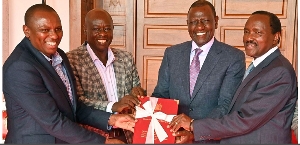 Rigathi Gachagua (L) and President William Ruto receive the report of the Natl Dialogue Committee
Rigathi Gachagua (L) and President William Ruto receive the report of the Natl Dialogue Committee
Around this time in 2023, political tensions in Kenya rose considerably following the daylight invasion by a gang of an expansive commercial farm in Kiambu belonging to the family of the country’s founding president Jomo Kenyatta.
The gang, who were armed with machetes and occupied the Northlands Farm for the better part of the day on March 27, stole hundreds of pedigree sheep and set fire to commercial trees before the police moved in.
Although no one publicly claimed responsibility for the attack, fingers pointed to local political allies of President William Ruto in central Kenya, who had accused his predecessor Uhuru Kenyatta of sponsoring opposition-led anti-government protests around the time.
During the 2022 election campaigns, the politicians affiliated with President Ruto’s United Democratic Alliance party had targeted the Kenyatta family, including former First Lady Mama Ngina Kenyatta, for attacks, calling them dynastic and anti-poor.
Neither President Ruto, who was out of the country, nor Deputy President Rigathi Gachagua immediately issued a public statement condemning the incident.
A year on this week, Gachagua, who sees himself as the political top dog in central Kenya, went on vernacular radio to apologise to the former First Lady for having dragged her into the dirty politics around the campaigns.
Mr Gachagua also appeared to send an olive branch to the former president Kenyatta, calling him “our son”.
While his change of tune would pass as personal, it goes deep into the heart of the problem President Ruto and his local allies face trying to pacify a political base that is increasingly growing restless with some of the government’s policies.
Faced with a groundswell of disgruntlement among farmers and small traders in the region complaining about recent taxes levied on produce and imported merchandise, a number of MPs who voted for President Ruto’s controversial Finance Bill have since come out to call for a review of the government’s tax policies.
Mr Gachagua, who has ambitions to consolidate his political support in the region with an eye on a future presidential bid of his own, has particularly had his hands full in recent weeks trying to extinguish one fire after another over the taxes.
On March 19, he sought to reassure avocado farmers that a tax imposed on farm produce would be reviewed after the farmers protested regulations by the taxman requiring them to register on its electronic invoicing system to ease tax collection.
Yet another fire waiting for President Ruto and his political allies in central Kenya to fight has been lit by bar operators protesting the closure of their businesses in an ongoing crackdown on illicit alcohol vendors.
This week, Mr Gachagua attended a meeting between a lobby representing traders who operate stores in downtown Nairobi, popularly known as Nyamakima, and revenue, anti-counterfeit and standards agencies to discuss grievances over taxes and goods seized at the port of Mombasa.
A decision was reached to reverse a recent increase in import duty and have some goods detained at the port of Mombasa over quality concerns released within two weeks